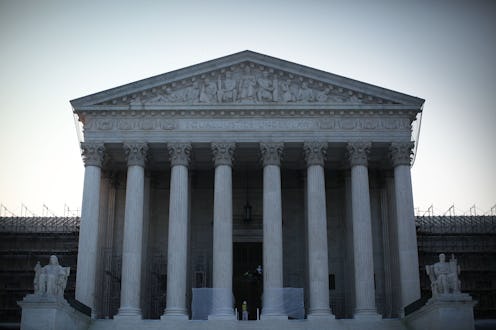News
What You Need To Know About The Hobby Lobby Case
On Tuesday, arts and crafts stalwart Hobby Lobby visits the Supreme Court. Tuesday is the legal crux of an ongoing battle by Hobby Lobby to deny its employees health insurance coverage for forms of emergency contraception. The thrust of the argument, as made by Hobby Lobby owner Steve Green, a Christian, is that being required to cover contraceptives like Plan B is a violation of his religious freedoms.
A ruling one way or the other in the case (Sebelius v. Hobby Lobby Stores, Inc.) would have incredibly far-reaching implications. Not just for employees of any company owned by someone of faith, but for consumers as well: any precedent about the "religious freedoms" of private businesses will have huge impact.
Heading into this big-time SCOTUS showdown, here are five things you should know.
1. It's Not Just About Contraception
The fight for the freedom of business owners to deny or discriminate against certain people and/or services has also been playing out at the state level lately, in the form of recent bills in Kansas and Idaho. Supporters of those bills would have allowed private businesses to refuse service to anyone who violated their deeply-held faith beliefs: the LGBT community, for example.
This is why one such bill, passed by Arizona's state legislature before being vetoed by Governor Jan Brewer, was widely condemned as imposing a state of anti-gay segregation, because it licensed a nearly-absolute right to exclude on faith grounds.
This was wider and more nefarious even than just being anti-gay, frankly. Given biblical mandates against a wide range of mundane modern behaviors, it potentially licensed a slew of random, faith-based rejections of certain types of people. And that, in a way, is the crucial core of this religious liberty litigation — a logical extreme which conservatives seem eager to push wherever they can.
2. It's Not Just Hobby Lobby's Contraception Case Being Heard Tuesday
Hobby Lobby is joined by Conestoga Wood Specialities, makers of kitchen cabinets, founded by conservative Mennonite Norman Hahn in Pennsylvania. Hahn is reportedly not so keen to have this case before the land's highest court, which his lawyer says he owes to his faith:
As Mennonites, they're not thrilled about going to court. They're probably the most reluctant clients I've ever encountered.
This is not to say that Hahn and his wife Elizabeth are non-political, however — they've financially backed Republican candidates before, the 2012 presidential candidacy of socially-conservative Christian former Senator Rick Santorum being a prime example.
3. The Challengers' Lawyer is a Champion of Conservative Causes
Hobby Lobby and Conestoga Wood will be represented in Tuesday's oral arguments by Paul Clement, an attorney whose name you may recognize. That's because wherever there is a controversial conservative cause going before the Supreme Court, you could hazard a decent guess he'll be involved.
In recent years he's argued against the constitutionality of the Affordable Care Act; against the Obama administration's halt on South Carolina's voter I.D. law, in favor of Arizona's SB 1070 anti-immigration law; and in favor of the Defense of Marriage Act. To put it simply, Clement is the in-guy for conservative causes, and he knows his way around the Supreme Court.
4. The Government's Lawyer Has Given People Pause, But Has Come Through Before
Standing opposite Clement Tuesday will be U.S. Solicitor General Donald Verrilli — again, a name that you probably recognize if you've been plugged into the Supreme Court in recent years. Verrilli was nominated to the post in 2011, and in a relatively brief time notched a historic win, arguing on the winning side of the Affordable Car Act's Supreme Court challenge in 2012.
But in the course of that case, his performance before the justices was derided by some observers as unfocused, meandering and fumbling.
He also argued unsuccessfully in a landmark case stripping away provisions of the Voting Rights Act, a failure which left both liberals and people generally concerned with disenfranchisement gnashing their teeth. That said, the scoreboard at the end of the day is what counts — he has won cases that Paul Clement didn't.
5. The Outcome Will Dictate The Future of Religious Freedom Exemptions
Sounds obvious, we know, but it's necessary to point out that the stakes of this case may extend well-past simply a precedent about contraceptive coverage. In the event that the court's conservative majority rules in favor of Hobby Lobby, it's possible (likely, even) that such will be used to make similar laws and challenges throughout the states.
In addition to being potentially precedent-setting on religious conscience exemptions, it also touches on issues of corporate personhood — is it really the case that the faith views of an owner can be implicitly those of a company, and govern the rights of the worker or the consumer?
As mentioned, Arizona, Kansas and Idaho have attempted to make this new reality come true via the legislative route, to allow private businesses to refuse services to people on the basis of faith. If the nation's highest court gives even an inkling that such is the right of a private business in a secular civil society, you can expect to see those efforts intensify.
As we've seen recently with anti-abortion laws throughout much of the southern United States, religiously-motivated conservatives are proactive and highly-motivated — if you give them an inch, you give them a mile.
